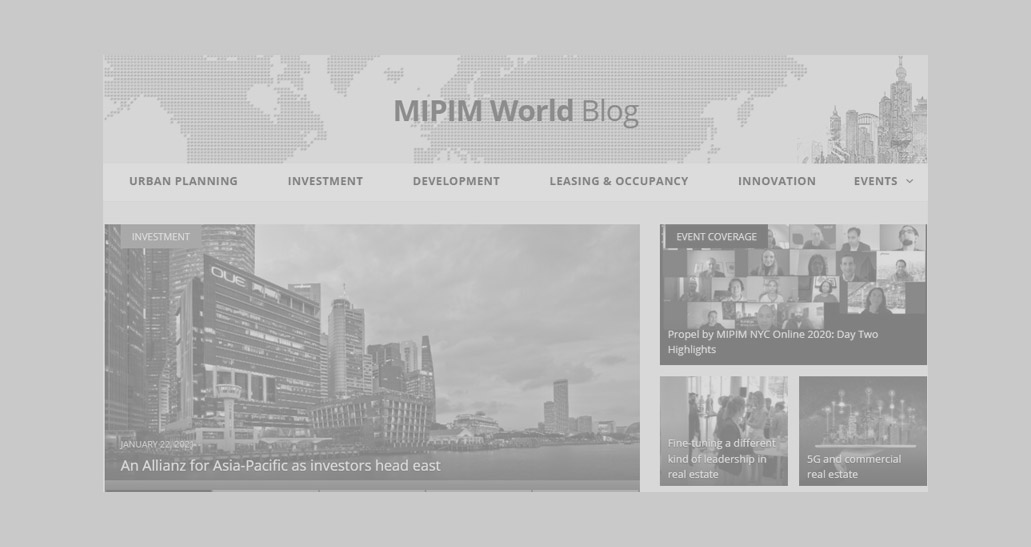Just as the MIPIM Young Leaders Summit called for the end of “green-washing”, so did the UK’s Committee on Climate Change (CCC) in its annual progress report issued this July.
The CCC, a government advisory body, wrote that the UK is on track to miss carbon-emission targets for 2025 and 2030 by an even bigger margin than in 2018. In addition, only one of 25 critical emissions-cutting policies was delivered in full in 2018.
“International ambition does not deliver domestic action,” the report said, with reference to the UK hosting a crucial UN climate summit in 2020.
This follows the UK becoming the first major economy to put into law a move to net zero carbon emissions by 2050.
Earlier this summer, the Government also launched its Green Finance Strategy, in response to which the UK’s leading financial authorities and regulators issued a joint statement on the “defining issue” of climate change.
“Climate change is no longer simply a social responsibility issue. It is a core financial risk” – Charles Counsell, The Pensions Regulator
“Climate change is no longer simply a social responsibility issue. It is a core financial risk impacting broadly across business, the economy and markets,” said Charles Counsell, Chief Executive, The Pensions Regulator, in the statement.
So far, the biggest carbon-emission cuts in the UK have come from the power sector. This now puts the onus on other sectors, such as property, to reduce their emissions.
At present, the built environment accounts for around 40% of the UK’s total carbon footprint, says the UK Green Building Council.
Redrawing the map of where people can live
As climate change leads to more extreme weather globally, from rising sea levels, to intense heat waves and stronger hurricanes, the map of where people can live is being redrawn, says the United Nations.
This is “leading to unprecedented human displacements and exposing humanity to increasing levels of insecurity”, said the UN.
In the UK, the CCC warned last October that by the 2080s up to 1.5m coastal properties may be in areas at significant level of flood risk due to rising sea levels and over 100,000 properties may be at risk from coastal erosion.
Low-carbon future at the top of the MIPIM agenda
Climate change and its interrelation with the topic of sustainability was at the top of the agenda at MIPIM 2019.
“We have to organise a collective vision of what has to be done to reach the [climate change]2050 goals”– Cédric Borel, IFPEB
The conference session on Engaging for Resource Efficiency was moderated by Cédric Borel, Executive Director, IFPEB, the French Institute for Performance in Buildings.
“We have to organise a different vision of the real estate industry and to produce a collective vision of what has to be done to reach the [climate change]2050 goals,” said Borel, with reference to the EU target to be net carbon neutral by 2050.
A major priority for the real estate industry will be decarbonising existing stock, given that around 80% of the 2050 building stock has already been built. This falls to the responsibility of property owners, designers and builders, said Borel.
Climate change is about health
“The move to cut greenhouse gas emissions is about health,” said Joyce Chan, Head of Sustainability, HOK, during the MIPIM session. As research quoted in The New York Times this summer revealed, the more global temperatures rise, the more people die.
“The move to cut greenhouse gas emissions is about health” – Joyce Chan, HOK
Better health and increased people productivity, as well as better-performing buildings, is how to make the business case for a more efficient use of resources, said Tobias Huber, Global Head for Energy Services & Projects, Siemens Building Technologies.
The transformation from green to smart
We need to leverage the transformation of the existing, outdated building stock to create smart buildings that “learn and interact with users over time”, said Huber.
It is about creating a “digital twin”, he continued, so that “all the assets are registered and connected”, and then observing the performance of the building over its “life cycle, from vision to demolition – always using the data as the foundation.”
“When we book a hotel, we look at the ratings; yet we don’t look at the rating of the building we spend half the day in” – Tobias Huber, Siemens Building Technologies
Data has been in silos to date, Huber added. Whereas data needs to be “integrated” not only within the building, but also within the block, the district and the city.
“It’s about developing a B2B2C model. When we book a hotel, we look at the ratings; yet we don’t look at the rating of the building we spend half the day in.”
Call for global standardisation
With hundreds of environmental benchmarking systems around the world, Chan mentioned that it was important to always “go back to the buildings that were built and measure the actual performance ».
“Very often we find the way we manage our building, or how the people use the building, is far, far away from the original certification,” she said.
The Action Plan produced by the Young Leaders at the MIPIM Young Leaders Summit also called for a unified, global environmental benchmark.
The importance of relationships
Josien Piek, Head of EMEA, GRESB, the Amsterdam-based ESG benchmark for real estate portfolios and assets, pointed out that large institutional investors are trained to look 20-25 years into the future.
“Carbon is an enormous challenge coming, and investors want to make sure that they are part of the solution” – Josien Piek, GRESB
“Carbon is an enormous challenge coming,” she said, “and [large institutional]investors want to make sure that they are part of the solution and not part of the problem.”
Data also helps build relationships between investor and manager. Data “informs” the relationship, by showing what is being done, what isn’t being done, and what is possible. “This can help bring the relationship up to a much higher level,” she said.
Turning brownfield into Prologis Logistic Parks
Prologis, the international developer and owner of logistics properties, and a member of GRESB, is ranked as the sixth most sustainable corporation in the world.
“Our culture is to make things that are not classical become classical” – François Rispe, Prologis
François Rispe, Prologis MD Regional Director Southern Europe, explained the company’s approach to the MIPIM audience: “Our culture is to make things that are not classical become classical.”

Prologis, the international developer and owner of logistics properties, and a member of GRESB, is ranked as the sixth most sustainable corporation in the world.
The Prologis approach is about:
- Converting brownfield sites into new logistics parks. Examples include: Prologis Park Dunstable near London, the UK’s first BREEAM ‘Outstanding’ accredited logistics park and Prologis Park Fokker Park, the largest private, airport-linked logistics park in Europe, adjacent to Schiphol Airport.
- Recycling, reusing or selling to third-party partners concrete, metal and other materials from the existing sites. “There was no recommendation or requirement to do this from the local communities or from the local administration. We did it on our own,” said Rispe.
- Managing storm water. At Prologis Moissy 2, on a site south of Paris once used by Group PSA to store car parts, Prologis has developed a system to keep storm water on site, in ditches and green hollows. This means that the water is absorbed gradually rather than going straight into the community sanitation system, with the risk of creating flooding and impacting drinking water.
- Developing multi-storey buildings, “using the air rather than the land”, as Rispe put it. Prologis has always done this in Japan, now it is doing this in the US and soon in Europe, he added.
- Producing and storing energy on site. This is then sold to Prologis’ tenants, with the idea that the tenants then also have a greener approach to their business. The challenge is to make it profitable, said Rispe. “The technology is not completely proven and it’s expensive, but we believe we will break through in the near future.”
The final word goes to Sean Tompkins, CEO, RICS. He said at the MIPIM Sustainability Forum: “How businesses act in the 21st century will be crucial in deciding the future prosperity and security of the next generations.” There is only one solution – to act now!



